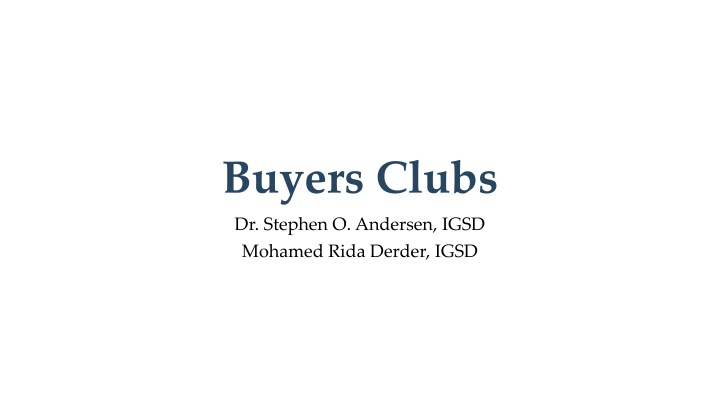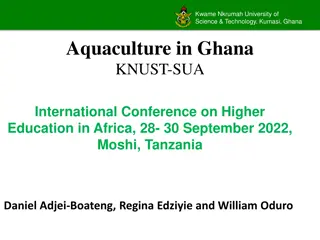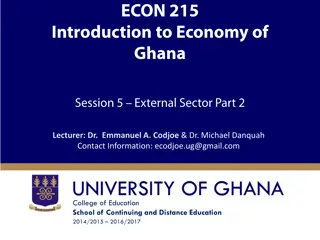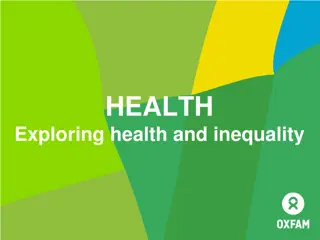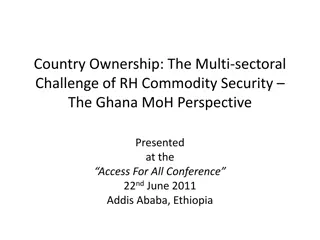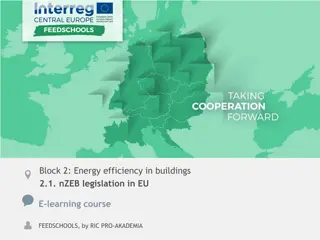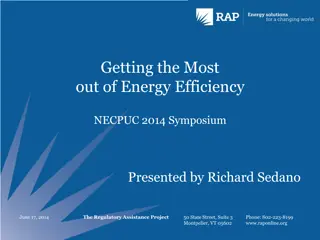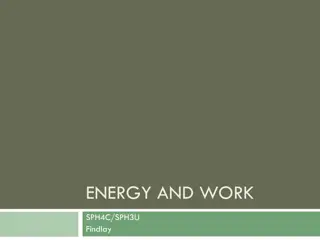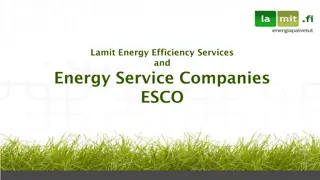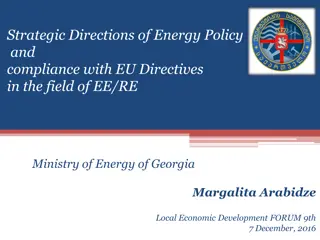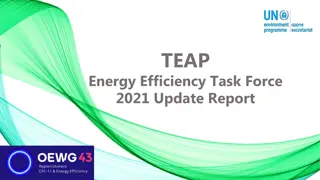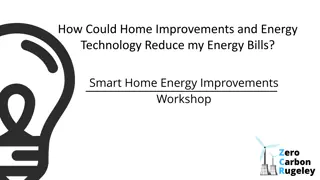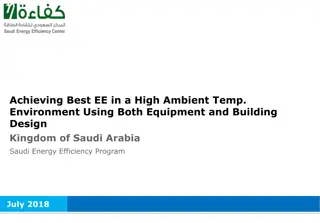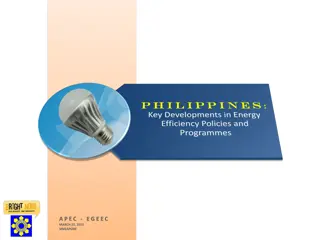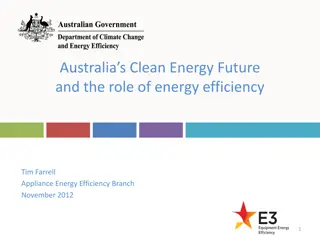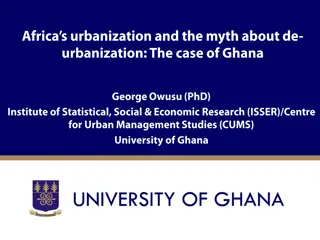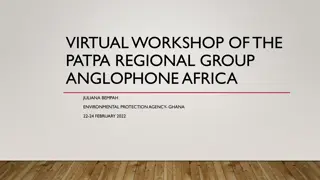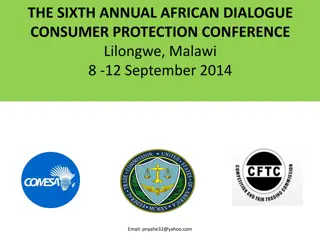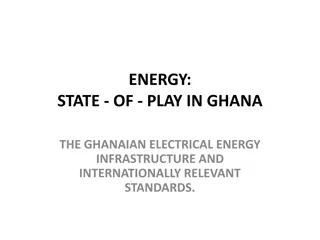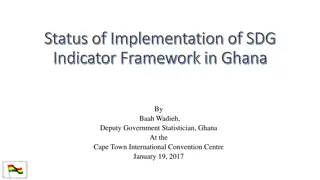Advancing Energy Efficiency Initiatives in Ghana and Beyond
Forcefully applying legal tools to stop dumping of obsolete appliances in Ghana, pioneering affordable AC solutions, creating jobs, and promoting sustainable practices in Morocco and Brazil through strategic partnerships and buyer clubs.
Download Presentation

Please find below an Image/Link to download the presentation.
The content on the website is provided AS IS for your information and personal use only. It may not be sold, licensed, or shared on other websites without obtaining consent from the author.If you encounter any issues during the download, it is possible that the publisher has removed the file from their server.
You are allowed to download the files provided on this website for personal or commercial use, subject to the condition that they are used lawfully. All files are the property of their respective owners.
The content on the website is provided AS IS for your information and personal use only. It may not be sold, licensed, or shared on other websites without obtaining consent from the author.
E N D
Presentation Transcript
Buyers Clubs Dr. Stephen O. Andersen, IGSD Mohamed Rida Derder, IGSD
Ghana REEECC & IGSD Partner to Stop Dumping of New & Used Obsolete & Inefficient Appliances Partners: Renewable Energy, Energy Efficiency, & Climate Change (REEECC), Ghana Energy Commission Institute for Governance & Sustainable Development (IGSD) Ambition: Forcefully Apply Legal Tools Consistent with International Trade Law to Stop Dumping of Obsolete and Inefficient Appliances in Ghana as a Model for all of Africa Meticulously Build the Legal Foundation for Increasingly Stringent Punishment and Retribution for Environmental Dumping Strengthen Capacity for Investigation and Monitoring of Activities That May Involve Environmental Dumping
Pioneered, with IGSD help, by Energy Efficiency Services Limited (EESL) of India Aggregated demand empowers affordable prices on next-generation AC Affordable price for superior technology helps put an end to dumping Now with advantage of excess manufacturing capacity from COVID-19 recession IGSD anticipates and is preparing for public procurement of AC for heat waves, building towards a just transition Fast action can make work-at-home more productive and energy efficient Bulk Procurement & Buyers Clubs 3
The Government of Morocco proposes to replace older room ACs that were inefficient at purchase and badly installed and maintained for energy efficiency; IGSD shopping for funding Bulk purchase justifies higher Minimum Efficiency Performance Standards and pushes energy-efficient design ACs removed would be recycled to avoid redeployment, with ozone-depleting and greenhouse destroyed in local cement kilns Jobs essential for recovery from the COVID-19 recession are created in manufacturing, logistics, installation, recycle, and service Morocco Buyers Club Moving Boldly Ahead gas refrigerants 4
Brazilian Access to High-Efficiency will Motivate Stronger MEPS and Buyers Clubs for Affordability The K-CEP funded Kigali Project is a successful partnership led by the Instituto Clima e Sociedade (iCS), with participation from Collaborative Labeling and Appliance Standards Program (CLASP), Instituto Brasileiro de Defesa do Consumidor (IDEC), the International Energy Initiative-Brazil (IEI), Lawrence Berkeley National Lab (LBNL), Mitsidi Projetos, and Uma Gota no Oceano IGSD will work with ICS to enable consumers to gain access to superior design, lower GWP, and more efficient products and components, and with public and private sector on aggregating demand for affordable prices of the most efficient, low-GWP appliances
Backup Slides That Follow Put Buyers Clubs in Context For Further Information search: IGSD Buyers Club or contact: Stephen O. Andersen, PhD IGSD Director of Research SAndersen @IGSD.org
Environmentally harmful dumping is the practice of exporting products to another country or territory that: 1) Contain hazardous substances; 2) Have environmental performance lower than is in the interest of consumers or that is contrary to the interests of the local and global commons; or 3) Can undermine the ability of the importing country to fulfill international environmental treaty commitments. Stopping Environmental Dumping Environmentally harmful product dumping includes export of technology that cannot legally be sold in the country of export as a consequence of failing to meet environmental, safety, energy efficiency, or other product standards. 7
First energy efficiency decision adopted immediately after the Kigali Amendment was adopted (introduced by Rwanda & Morocco); the decision sought to implement anti-dumping measures (Oct 2016) Anti-dumping included in Biarritz Pledge (Aug 2019) Anti-dumping included in AMCEN Declaration (Nov 2019) Anti-dumping concept first expanded in IGSD Duke Law Journal Defining the Legal and Policy Framework to Stop the Dumping of Environmentally Harmful Products (Oct 2018) Anti-dumping included in IGSD Assessment of Climate and Development Benefits of Efficient and Climate-Friendly Cooling(Jan 2020) IGSD side event on Stop Environmental Dumping at Montreal Protocol 30th Meeting of the Parties (Nov 2018) & introduced in a proposal for a draft decision by the representative of Rwanda, speaking on behalf of the African Group. [The representative] drew attention to the problems caused by the dumping of obsolete and inefficient equipment in African markets, which undermined efforts by African countries to meet the climate challenge. Anti-dumping included in TEAP Report V.3: Assessment of the Funding Requirement for the Replenishment of the Multilateral Fund for 2021- 2023 (May 2020) New CLASP/IGSD Report shows African AC markets dominated by low-efficiency equipment using obsolete refrigerants (Report 24 June 2020, Webinar on Report 1 July 2020) 8 Building the Evidence Base >> Socializing >> Policy Development
Environmentally Harmful Dumping of Inefficient and Obsolete Air Conditioners in Africa New CLASP and IGSD study shows African AC markets dominated by low-efficiency equipment using obsolete refrigerants Used and defective products also being exported from EU and Asia IGSD partnering with Ghana to stop dumping Non-African Company 26% Brand Unidentified; Assembled in Africa 27% Imported 26% Local Subsidiary of Non-African Company 6% Assembled in Africa 74% African Company 18% African Company/Non- African company JV 23% Origins of low efficiency RACs sold in 10 African countries (N=651,273). Source: CLASP/IGSD, Environmentally Harmful Dumping of Inefficient and Obsolete Air Conditioners in Africa (2020). 9
Brazil Moving Boldly Ahead Building Market for Efficient AC INMETRO* July 2020 Labeling Law raises the bar on efficiency From 2022 A labeled AC must be at least 52% more efficient than current A rated models; and from 2025 A labeled AC must be at least 108% more efficient The new regulation adopts the stringent ISO 16358 seasonal metrics Many of Brazil s major AC manufacturers have pledged to adopt the 52% threshold immediately More details of the new regulation can be found here.
